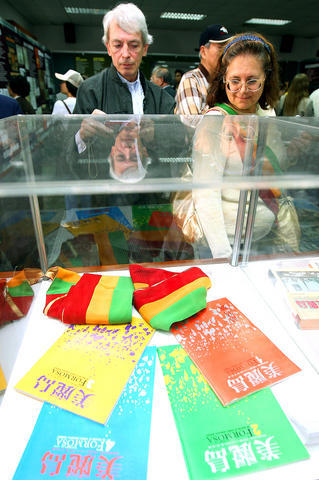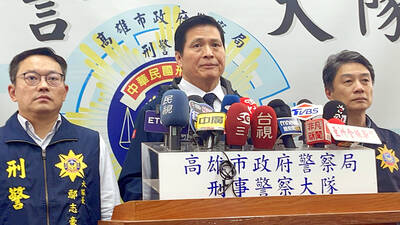With the inauguration of the Taiwan Human Rights Jingmei Park scheduled for today, memories have been flooding back for Klaus Walter, who played a key role in rescuing political prisoners in Taiwan in the 1980s.
On Saturday, the German human rights activist recalled his first encounter with the case of a Taiwanese political prisoner immediately after joining Amnesty International's (AI) Group 1400 in Bonn in 1975.
"I tried to find out all the facts in political prisoner cases [that] were not easy to obtain, as officials in Taiwan never responded to letters sent by AI," said Walter, who is now director of AI Germany's Membership Support Department.

PHOTO: CNA
After getting better acquainted with similar cases in Taiwan, he decided to form a Taiwan Coordination group to gather all available information on all political prisoners and general information about the country itself, he said.
"The Kaohsiung Incident on Human Rights Day in 1979 created many `new' political prisoners for us to gather information on," he said.
The most "famous prisoners" were Vice President Annette Lu (呂秀蓮), Kaohsiung Mayor Chen Chu (陳菊), former Democratic Progressive Party chairman Shih Ming-teh (施明德), Reverend Kao Chun-ming (高俊明) and a few others, Walter said.
"We started a kind of small campaign within AI. We invited all the coordinators from Sweden, the US, Britain, Holland and Germany to get involved," Walter said, adding that "we told them to try to convince their respective sections to go international and start a campaign for Taiwan."
Talking about his efforts to gather information on Taiwan's political prisoners, Walter said the process was very difficult, because "you rarely got an answer, and if you did, it was usually from the Government Information Office [GIO]."
"Trying to find out whether the information provided by the GIO was true was the toughest part," he said.
"The first real response we got was from the Taipei mayor at the time -- Lee Teng-hui (李登輝)," Walter said. "He was the first person to write back saying `yes, there is a case.'"
Walter said that Lee Shen-hsiung (李勝雄), a lawyer at the time and now the head of AI Taiwan, was also a person who worked courageously in trying to gather information and confirm the arrests of political prisoners.
"He was one of our main contacts in Taiwan at the time," Walter said, adding that "I am glad he is the chair of AI Taiwan because he really deserves it."
Human rights activists from Japan who worked with AI -- including Nishikura Kazuyoshi, Watarida Masahiro, Tezuka Toshio, Kinoue Takanobu, Kobayashi Masanari, Okawa Shiro and Ito Midori -- are expected to join Walter today at the Jingmei park opening ceremony.
"I'm glad that I'll have the opportunity to meet at this event with those who worked with us in Japan," Walter said.
Asked who had impressed him most in Taiwan's pro-democracy movement, Walter answered "Chen Chu."
"She really impressed me a lot," Walter said, adding that "she proved to be a real person, with personality."
Walter said that Chen Chu had already been involved in human rights work before the Kaohsiung Incident.
"I am very glad that someone like her is now a leading politician," Walter said.
He said he would have the opportunity to meet Chen Chu again, adding that the 30th anniversary of the Kaohsiung Incident is two years from now. Kaohsiung, he said, should be named a "human rights city."
The Kaohsiung Incident, also known as the Formosa Incident, was the result of pro-democracy demonstrations on Dec. 10, 1979. It played a very important role in the nation's democratic development.
Walter first visited Taiwan in the middle of 1989 to help establish the first AI groups in the country and meet former political prisoners, politicians and dignitaries.
During his second visit in 1995, at the invitation of the Taiwanese Association of Human Rights, Walter took part in a televised discussion with then-minister of justice Ma Ying-jeou (馬英九), mostly on the use of the death penalty.
During that visit, he also toured Kueishan Prison, where he met the "Hsichih Trio"on death row.
Upon seeing the three with their feet chained, Walter recalled that he could not accept the way they were being treated, saying it was "degrading."
On the development of human rights and democracy in Taiwan, Walter said he is happy that "we don't have to torture or mistreat prisoners in prison or in police custody, which is good."
Walter said the concept of human rights is "normal," adding that there is still much room for Taiwan to improve in terms of human rights education and its overall education system.
He urged people to pay more attention to international issues, such as Darfur and Myanmar.

Twenty-four Republican members of the US House of Representatives yesterday introduced a concurrent resolution calling on the US government to abolish the “one China” policy and restore formal diplomatic relations with Taiwan. Led by US representatives Tom Tiffany and Scott Perry, the resolution calls for not only re-establishing formal relations, but also urges the US Trade Representative to negotiate a free-trade agreement (FTA) with Taiwan and for US officials to advocate for Taiwan’s full membership in the UN and other international organizations. In a news release announcing the resolution, Tiffany, who represents a Wisconsin district, called the “one China” policy “outdated, counterproductive

Actress Barbie Hsu (徐熙媛) has “returned home” to Taiwan, and there are no plans to hold a funeral for the TV star who died in Japan from influenza- induced pneumonia, her family said in a statement Wednesday night. The statement was released after local media outlets reported that Barbie Hsu’s ashes were brought back Taiwan on board a private jet, which arrived at Taipei Songshan Airport around 3 p.m. on Wednesday. To the reporters waiting at the airport, the statement issued by the family read “(we) appreciate friends working in the media for waiting in the cold weather.” “She has safely returned home.

ON PAROLE: The 73-year-old suspect has a criminal record of rape committed when he was serving in the military, as well as robbery and theft, police said The Kaohsiung District Court yesterday approved the detention of a 73-year-old man for allegedly murdering three women. The suspect, surnamed Chang (張), was arrested on Wednesday evening in connection with the death of a 71-year-old woman surnamed Chao (趙). The Kaohsiung City Police Department yesterday also unveiled the identities of two other possible victims in the serial killing case, a 75-year-old woman surnamed Huang (黃), the suspect’s sister-in-law, and a 75-year-old woman surnamed Chang (張), who is not related to the suspect. The case came to light when Chao disappeared after taking the suspect back to his residence on Sunday. Police, upon reviewing CCTV

TRUMP ERA: The change has sparked speculation on whether it was related to the new US president’s plan to dismiss more than 1,000 Joe Biden-era appointees The US government has declined to comment on a post that indicated the departure of Laura Rosenberger as chair of the American Institute in Taiwan (AIT). Neither the US Department of State nor the AIT has responded to the Central News Agency’s questions on the matter, after Rosenberger was listed as a former chair on the AIT’s official Web site, with her tenure marked as 2023 to this year. US officials have said previously that they usually do not comment on personnel changes within the government. Rosenberger was appointed head of the AIT in 2023, during the administration of former US president Joe